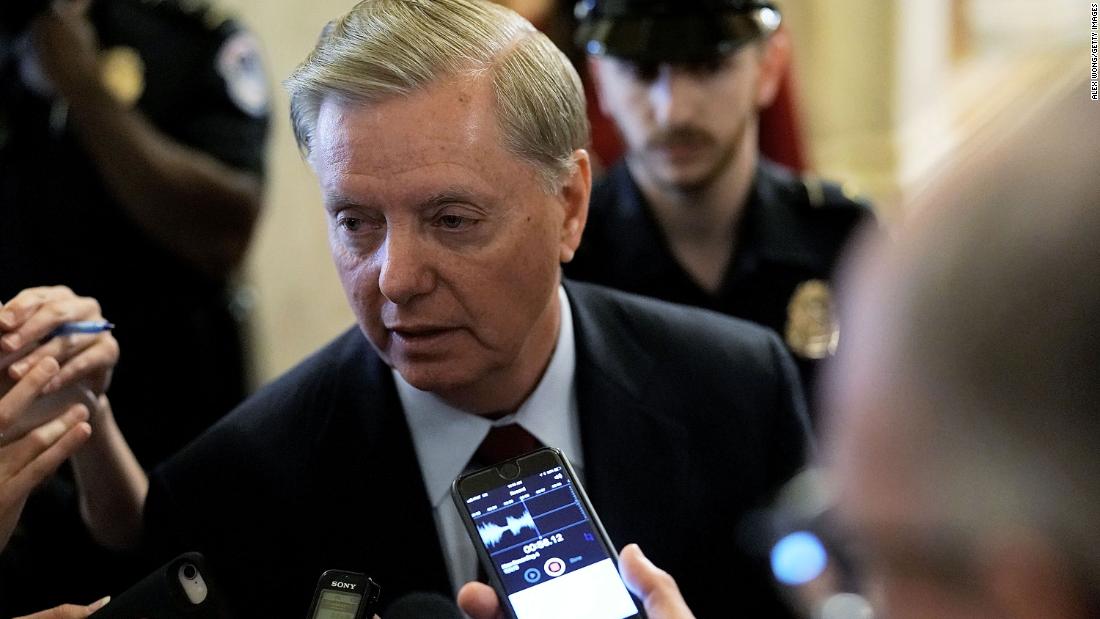
1. Chairman Graham?
One of President Donald Trump's closest allies in Congress may soon take over the critical Senate Judiciary Committee.
Republican Sen. Lindsey Graham of South Carolina is in line to wield the Judiciary gavel if the current chairman, Iowa's Chuck Grassley, decides to lead the Senate Finance Committee instead, CNN's Manu Raju reports.
"He's expressed concerns about the way the Russia investigation has been conducted, the way the Clinton email investigation was being conducted," Raju said. "So we'll see if he brings a counterbalance to the House Judiciary Committee, which next year is going to be very aggressive in investigating the President."
As chairman, Graham would also help shepherd any possible Trump Supreme Court nomination -- and there may be a key difference between him and the President on that topic.
"He told me after the Kavanaugh confirmation that if there's a vacancy in 2020, he's reluctant to move forward with a nominee, to hold to the precedent" that Senate Majority Leader Mitch McConnell established in 2016 when he refused to consider the Merrick Garland nomination. "We'll see if he ultimately stands by that, if it actually happens."
2. Utah moves left
Utah voters showed signs of a progressive streak on Election Day: Voters there approved referendums to expand Medicaid and to legalize medical marijuana.
"This is an extremely conservative state, one of the most conservative states in the country," the AP's Julie Pace said. "But voters there still passed two ballot initiatives that tend to be favored by more liberal voters."
"This is really a fascinating example of two initiatives that were stalled by deeply conservative lawmakers in the state, and then it went to the voters, who ultimately pushed both of these issues over the finish line," Pace said.
3. Pink wave on Capitol Hill
At least 102 women were elected to the House last week, smashing previous records. And Politico's Rachael Bade said it could have a very real impact in the halls of Congress.
"Many of them are young mothers," Bade said. "They are putting nursing stations around the Capitol. They are talking about putting diaper-changing stations in lawmaker bathrooms. They're basically doing a reassessment to make sure it is a friendly work environment for mothers."
All those young mothers and millennial men entering Congress will have another impact too: They'll drag the average age of the next Congress down by a decade.
4. Trump 2020 gears up
The midterms are over, but don't expect Trump to stay off the campaign trail for too long, reports The Washington Post's Josh Dawsey.
"They're already eyeing places to go in January, and they have $106 million or so in the bank," Dawsey said. "The President was looking at his numbers in all these districts he was campaigning in, comparing them to 2016, trying to come up with a schedule for 2020 events that would benefit him."
5. A 2020 GOP primary?
And from CNN chief national correspondent John King:
You can get to 40 names, even more, if you jot down a list of Democrats who are going to spend time in the next weeks and months deciding whether they want to run for President and whether they could do what it takes to mount a credible effort.
But how many Republicans are having that same conversation?
The big 2018 midterm shifts do expose serious demographic issues for Trump and his party as we move from 2018 into the early days of the 2020 cycle. But for all the GOP's problems, base loyalty to the President is not among them -- so any potential GOP challenger understands it is the steepest of hills. At least based on everything we know today.
Some Republicans say it is a fight that must be fought, regardless of the odds. Retiring Sen. Jeff Flake of Arizona is in this camp. He told Politico on Friday that he hasn't ruled out a 2020 challenge but said there are others who would be good candidates, too.
One of those he mentioned is Ohio Gov. John Kasich, who is the first potential Trump challenger due to pop up in one of the early states on the 2020 nomination map.
Kasich is due in New Hampshire on Thursday to speak at a dinner honoring the First Amendment and a free press. The irony there is obvious given Trump's constant attacks on the media.
In a brief conversation the other day, it was clear Kasich was reviewing the 2018 results in fine detail; he had informed observations about big shifts in the suburbs toward the Democrats and about deep-red areas dominated by working-class white voters.
As for the New Hampshire visit, Kasich says he is keeping a commitment made well in advance of the midterm vote and that it is far too early to talk definitively about 2020. But the visit will get him some attention and allow him to spend time with loyal veterans of his unsuccessful 2016 primary run to get a sense of the Granite State landscape now.
No comments:
Post a Comment